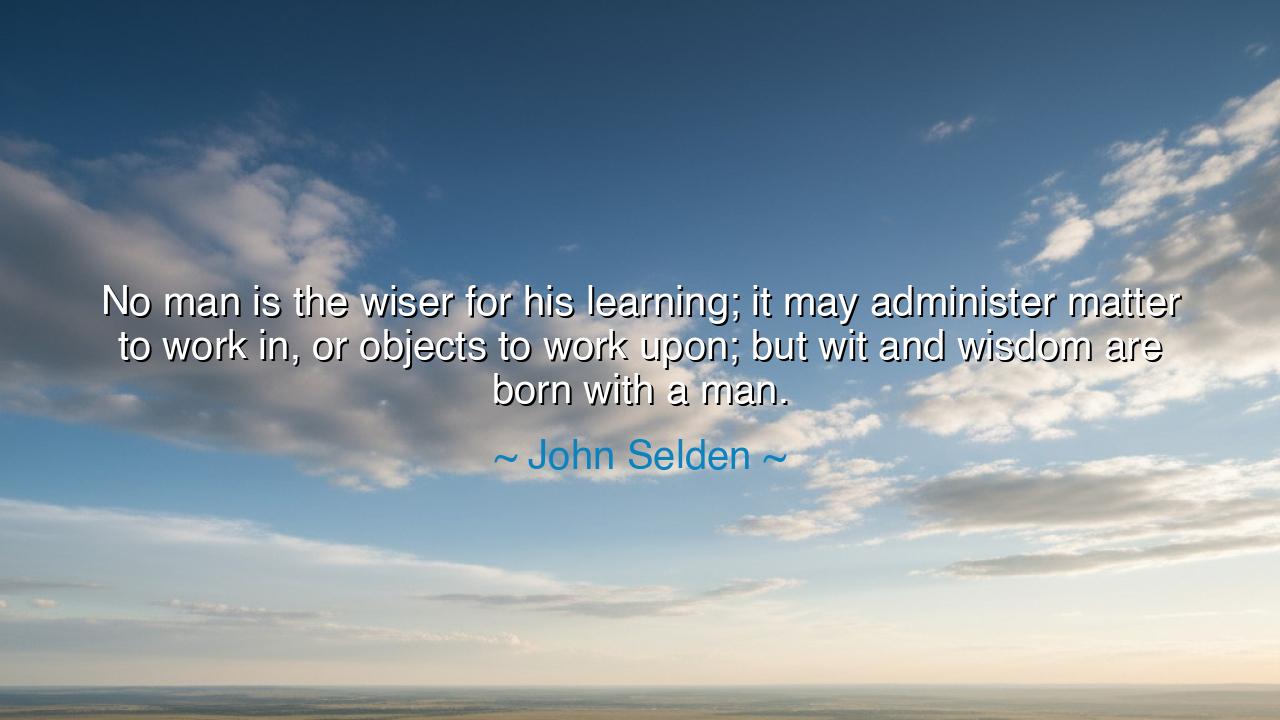
No man is the wiser for his learning; it may administer matter to
No man is the wiser for his learning; it may administer matter to work in, or objects to work upon; but wit and wisdom are born with a man.






When John Selden wrote, “No man is the wiser for his learning; it may administer matter to work in, or objects to work upon; but wit and wisdom are born with a man,” he spoke as one who understood the limits of scholarship and the boundless depth of human nature. Selden, a great jurist and scholar of seventeenth-century England, was surrounded by books, intellect, and debate. Yet from the heart of all his study arose a truth older than any library: learning can fill the mind, but only wisdom can awaken the soul. Knowledge may polish the tongue and sharpen the reason, but wisdom — that rare and sacred power — is something breathed into a man at birth, part of the very essence of his being.
In this saying, Selden does not scorn education; he reveres it but places it in its rightful order. He reminds us that learning is the tool, not the craftsman. Books provide the clay, but wit and wisdom shape it into meaning. Many men grow old in study and yet remain foolish, while others, though unschooled, speak with the insight of sages. For wisdom is not taught — it is awakened. It is the light already within, which learning may feed but never create. As the ancients would say, the lamp burns because of the flame inside it, not because of the oil poured around it.
Consider the example of Socrates, the philosopher who claimed to know nothing. Surrounded by men of learning — poets, statesmen, and sophists — Socrates exposed their ignorance not through superior knowledge, but through superior wisdom. He saw that memorizing facts and repeating arguments could not replace self-knowledge and humility. He understood that true insight comes not from accumulation, but from discernment — the ability to separate the shadow from the light. Like Selden, he knew that education is the scaffolding, not the temple; the structure may stand tall, but it is empty without the spirit that fills it.
Selden’s words also echo through history in the lives of those who acted with greatness born not from books, but from instinct and character. Joan of Arc, an unlettered peasant girl, could neither read nor write, yet her wisdom outshone the scholars who judged her. She spoke and moved with the clarity of conviction, guided not by study but by truth written upon her soul. Likewise, many a simple villager, farmer, or mother has spoken words of greater depth than the speeches of kings. Such examples reveal what Selden meant when he said that wit and wisdom are born with a man — they are gifts of nature, not trophies of intellect.
Still, learning has its place and power. Selden does not deny it. He says it “administers matter to work in,” meaning that education provides the soil in which the seeds of wisdom may grow. A man without learning may be wise, but his wisdom will remain wild and unshaped, like a river without banks. Learning gives form and discipline, but it cannot give life. A library is a treasure house of ideas, but only a living mind can turn them into understanding. The danger lies in mistaking the collection of knowledge for the possession of wisdom — a mistake made by many who prize intellect above intuition, and memory above judgment.
In the ancient world, this truth was woven into philosophy and myth. The Greeks worshipped Athena, goddess of wisdom, who sprang fully formed from the head of Zeus — not as a student, but as a living embodiment of understanding. Her birth itself was a symbol of innate wisdom, not acquired learning. She stood for discernment, strategy, and clarity — the natural light of reason that guides humanity. Selden’s thought flows from the same spring: wisdom is not the harvest of reading but the fruit of perception and experience, a divine spark within the human mind.
Thus, the lesson of this quote is eternal: seek knowledge, but serve wisdom. Let books be your tools, not your masters. Read to refine your thoughts, not to replace them. Learn from the world, but trust also the quiet voice within that whispers truth when all other voices are silent. Study to gain knowledge, live to gain understanding, and listen deeply — for wisdom often speaks in silence, in experience, and in the stillness of the heart.
So remember, child of thought and time: learning fills the mind, but wisdom shapes the man. The wise are not those who know the most, but those who see the clearest. Cultivate your wit — that quickness of perception — and guard your wisdom — that purity of judgment. For while learning may fade and knowledge may grow obsolete, wisdom endures like the sun: ever ancient, ever new, and forever lighting the path of those humble enough to seek its glow.






AAdministratorAdministrator
Welcome, honored guests. Please leave a comment, we will respond soon